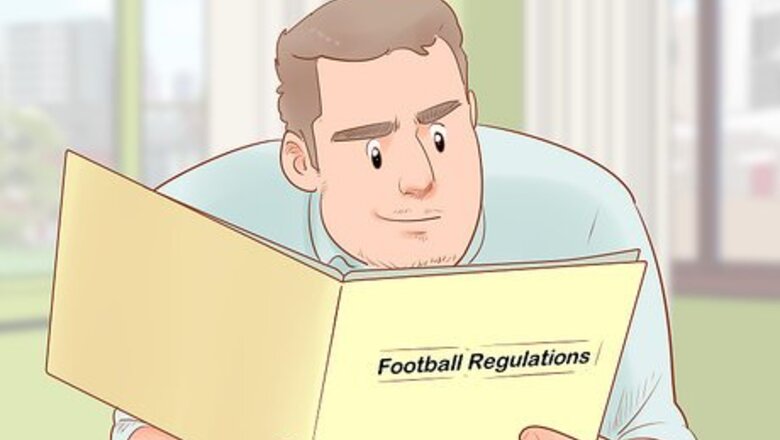
views
Developing Relevant Skills
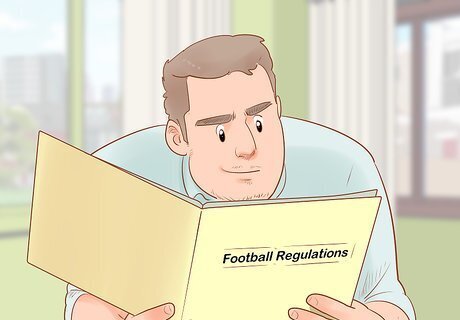
Have an understanding of the sport. Know the regulations of football on a local and international level. Read through the current regulations for your association in regards to player stats, other agents, and the latest news. Speak with officials you already know and spend a lot of time learning the inner-workings of the game. Focus on learning how transfers between football clubs work nationally and internationally. This will be one of the main focuses of being an agent.

Learn the basics of civil and contract law. Agents have to know how to write and negotiate a contract as well as understand their client’s personal rights so they can properly represent them. Consider taking courses online or at a university so you know all of the laws you need to follow when you’re an agent. Civil and contract laws are included in the examination required to get an agent’s license. The more knowledgeable you are, the better chances you have at becoming an agent. Contract law is about fulfilling promises made in a contract. Recognize if stipulations in contracts are able to be met by both the clients and the agent.

Start developing interpersonal skills. Be an active listener during conversations by letting others speak and making eye contact. Let them know you understand what they’re saying. Show your appreciation for others by telling them when they do a good job. Interpersonal skills help you develop better teamwork and communication. Work on solving problems with others and take all options into consideration. This can help develop your negotiation skills. Practice leadership by assisting others and leading by example.

Study business management. Start working on how to understand and manage financial data and how to make decisions based on budgets. Management requires critical thinking and problem solving, so work on these skills to get better at working as an agent. Consider getting a formal degree from a university to give yourself more authority. Follow the markets for your football association closely to see what deals and contracts have been made so you know what to expect going into your field.
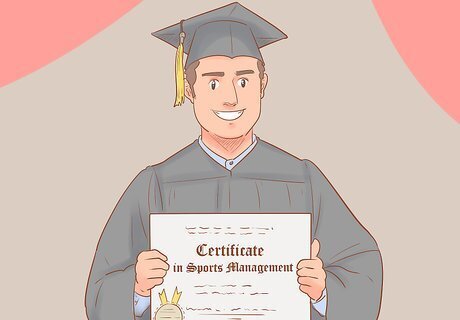
Get a degree in sports management for a formal education. Although it’s not required to have a degree to become a football agent, it will help you understand the ins and outs of the field you’re going into. Look into universities or postgraduate opportunities that offer these courses. Even a few courses can help you have a better understanding if you don’t have the time to get a full degree.
Getting Licensed
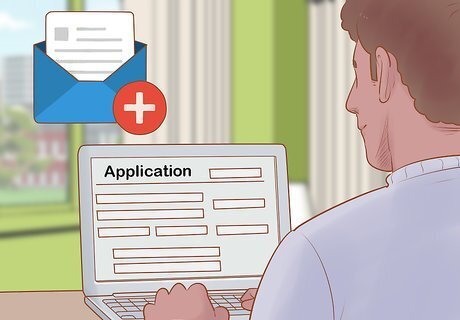
Send an application to your national football association. Look for the application online for the association based on your nationality and fill it out completely. The application asks for standard background information, so be sure to fill it out fully and honestly. Send the application along with the required application fee to be taken into consideration. Prospective agents cannot have criminal records for financial or violent crimes. Candidates for the license cannot have worked as an official or employee at any football club, including FIFA.

Take the written exam in March or September. If your application meets the criteria to be an agent, the association will invite you to take their required exam. The written examination consists of 20 multiple-choice questions that ask about football regulations on transfers as well as civil and contract laws. The exam should take approximately 90 minutes. The exact dates of the test typically get announced by FIFA in January and June so you have time to prepare. Study civil and contract laws and make sure you are familiarized with the current regulations for your football club.
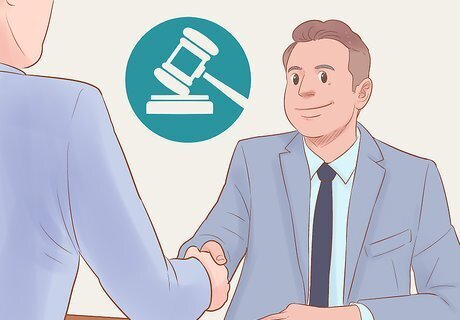
Get professional liability insurance. Once you pass the examination, the last thing you need is insurance with a reputable company. This helps to cover any risks associated with your activity or termination. Reach out to your current insurance provider to see if it can be added to your existing policy. If not, reach out to national insurance providers and ask for a quote. The average yearly cost of professional liability insurance is about $767 USD. Make sure the insurance is made out in your own name or else it will not be accepted. As an alternative, you can also provide a bank guarantee from a Swiss bank with the minimum amount of $100,805 USD.
Making Contacts within the Sport

Check if any agencies offer internships. Speak to the heads of your local sports agency or reach out with an inquiry email. Ask if they have any voluntary positions or available internships so you can get experience in the field. Once you’ve gotten established, you can work on your own as a freelance agent for players. Working for an established agency may be easier starting off than trying to be a freelance agent. This way, you’re able to get a fixed income as well as work under a known name.

Meet with former coaches or players to get recommendations for clients. If you played football previously, keep in contact with your old colleagues and coaches. They may still know others in the business and help you network. Ask them if they notice any players that stand out or any that they’re interested in. Don’t burn any bridges between any old teammates you may not have gotten along with. They may be the networking opportunity you need to meet more players. Coaches have an expertise at seeing what players excel in the game. Always reach out to them to see who they’ve taken notice of.

Talk with the club officials to stay connected. The officials can help point you towards new talent that you may not have considered before. They may also need your services if they are looking to buy a player out of their contract. Be sure to reach out to them often to see if they know players that need representation.

Ask friends who watch football if they’ve seen any interesting players. Even if your friends aren’t professionals, see if they have watched someone who surprised them. Although they may not be in the sports industry, they may see details or unique people everyone else has overlooked. Look for people who frequently attend football games and ask them who they’ve taken an interest in. They may have opinions on players you may not have considered.
Representing Players
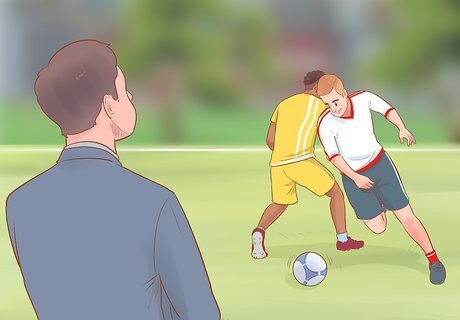
Scout minor league games and matches to find up and coming players. Attend a lot of games so you get a feeling for how consistent certain players are. Watch their movements and how they behave on and off the field. When you find someone that you’re interested in, you can speak to them about representing them as an agent. Local players who haven’t joined large football clubs will be the easiest to find since many players higher up will already have representation.

Agree on the details of a contract with a player you want to represent. The contract should include details about who is involved, how long the terms are, what services you’re including for your client, how to terminate the contract, and the percentage you’ll take as a salary. Make sure the player is fully aware of everything in the contract you’ve drawn up before they sign and answer any questions they may have. The maximum amount of time the contract is valid is 2 years. Use an exclusive contract so you’re the only agent that can represent them. If the player you’re signing is a minor, their legal guardians also need to sign the contract. The standard pay cut for a football agent is around 10% of the profits the player makes, but it can vary to fit your needs.
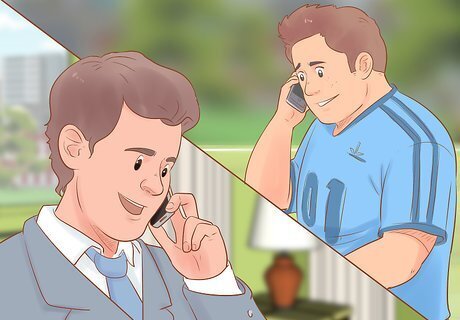
Stay accessible to your clients over the phone. Make sure your client is able to reach you when they are presented with opportunities. Carry your cell phone or consider getting a separate phone strictly for your clients to reach you. Use digital communication apps like Skype so players can easily contact you with cellular data or an internet connection.
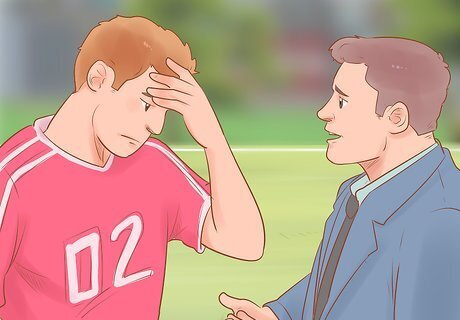
Be supportive of your clients through personal difficulties. If the player you’re representing is going through a tough time, do what you can to help them through it so they can focus on the game. Handle any grievances they may have against the football club they’re a part of. Help your client relax in times where they feel under pressure or stressed.

Act as your client’s spokesperson for the media. If there are opportunities for sponsorships or media endorsements, make sure the player consults with you first or speak for them. Discuss any contracts or what the endorsement entails so you know if it’s a good deal for the player. Explicitly state your plan for media sponsorships or appearances in your contract so your player knows how to handle the situations.
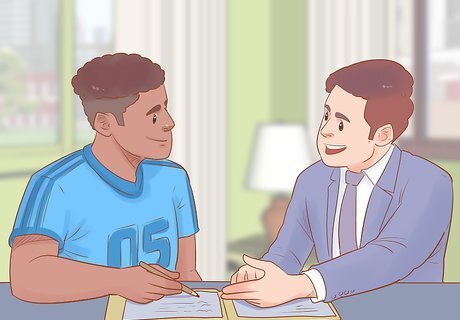
Negotiate contracts for your client. Have a clear understanding of your client’s interests so you know what needs to be in the contract. Take salary, location, the length of the contract, and any injury compensation into consideration. Try to work together with who you’re negotiating with in order to get the best deal for your player. Make sure you get the deal you agreed upon in writing so it is clear and concrete. Listen to the party you’re negotiating without interruption. Take notes on the main points they hit on before bringing up your talking points.


















Comments
0 comment